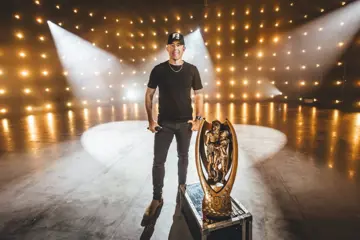New York's Robert “Bobbito” Garcia (aka Kool Bob Love) stands as one of the most influential players in hip hop culture. He is a radio host, DJ, journalist, streetball ambassador, sneaker curator and acclaimed filmmaker. Now he’s finally visiting Australia, or at least Melbourne – Garcia will be DJing exclusively at The Brooklyn Block Party as well as presenting his latest documentary, Rock Rubber 45s.
"I've been a public figure since 1990 and, oddly enough, I've never been to Australia," he muses. "Thankfully, I have had my films screened out there… Unfortunately, there was never a budget to actually fly me out to be present for a Q&A or to DJ at an afterparty or whatever… So I'm looking forward to landing in Australia for the first time. There's been nothing but excitement on social media – a lot of hits and a lot of activity, people talking about me coming – so I'm very happy."
Garcia grew up in a Puerto Rican family in New York. Though his father was a Latin jazz musician, Garcia's own focus initially was basketball, and he competed professionally back in Puerto Rico. But, in the Big Apple, Garcia was exposed to the nascent hip hop movement, hanging with the Rock Steady Crew. On graduating from university, he scored a gig at Def Jam. Here, Garcia befriended the DJ Stretch Armstrong (Adrian Bartos). Through the '90s, they hosted the cult program The Stretch Armstrong And Bobbito Show on the college station WKCR, among their unsigned guests future stars Nas, The Notorious BIG and the Wu-Tang Clan. It was bootlegged globally.
Garcia started DJing mid-decade. While he admired Little Louie Vega, DJ Spinna and Rich Medina, it was Bartos who was immediately formative. "I wouldn't be DJing if it wasn't for Stretch," Garcia notes.
"I have a strong sense of identity, a strong sense of my own history, because it's mine."
Don't miss a beat with our FREE daily newsletter
However, Garcia was determined to have his own steez. "I wanted to be Bobbito, and I achieved that very quickly. Technically no, it took a long time to learn the craft but, in terms of selection and vision, yes. I think, from jump, I had something different that I was doing than what other DJs were doing, and I still feel like that."
Garcia would develop into a "freelance creative". He notably invented sneaker journalism. In fact, latterly Garcia has gravitated to filmmaking – first co-directing 2012's doco Doin' It In The Park: Pick-Up Basketball, NYC. He reconnected with Bartos when shooting Stretch And Bobbito: Radio That Changed Lives. The reception was such that the pair were approached by NPR to launch a podcast, What's Good? With Stretch & Bobbito, covering arts, sport and current events. For Garcia, this required he relocate to Washington DC, but it was temporary. "We did two seasons with NPR. Unfortunately, they did not renew us for a third season."
Garcia contentedly returned to NY. "I live in Brooklyn – proudly," he laughs.
Even while engaged at NPR, the multitasking Garcia was filming Rock Rubber 45s, a "DIY project" that came out last year. From the outset, he envisaged Rock Rubber 45s as part-autobiography, part-cultural history. "I have a strong sense of identity, a strong sense of my own history, because it's mine," Garcia admits. "I'm not interpreting someone else's life. But it was a beautiful process and one that wasn't just a personal narrative."
Rock Rubber 45s is raw – dealing with issues of cultural identity, childhood sexual abuse and trauma – but relatable. "It's not a light film. It dives into some delicate and sensitive moments."
The most surprising interviewee is Garcia's mother figure, soul legend Patti LaBelle.
In the meantime, Garcia and Bartos have reinvigorated their partnership to the point where they're now recording music together.
"Stretch and I, we have not stopped grooving as a duo. We actually recorded an album earlier this week, literally, for ten-time Grammy Award-winning Latin music legend Eddie Palmieri's new label Uprising NYC and it will be released in September of this year [Palmieri recorded music for Rock Rubber 45s]. We'll probably drop some singles leading up to it… It's a live band and it's unlike anything, or any album, I've ever heard personally – and I'm a historian, an aficionado, a DJ/producer.
“I’m very proud of what we did and accomplished. I don't wanna talk too much about it yet, though, 'cause it's just too early… But the name of the album is No Requests and it's Stretch and Bobbito with The M19s Band. We have a stellar, stellar group of elite musicians who contributed."
Garcia himself has interviewed many an icon over the years, but his most memorable experience was vibing with Stevie Wonder for What's Good?. "He's like my all-time favourite artist. He wound up responding to our questions by playing the piano and singing, which we could have never in our wildest dreams anticipated."
Today, hip hop's broadcasting personalities often act as provocateurs – Joe Budden infamously hypercritical of the new wave of cloud, or 'mumble', rappers. Yet Garcia isn't preoccupied with rap's generational divide.
"I think the peak of the creativity of hip hop, oddly, was over 25 years ago."
"I don't have much to say about that," he says candidly. "I stopped being a purveyor of the entire culture almost two decades ago. In the '90s, I was writing for Rap Pages and Vibe magazine and The Source and I had the radio show and I had my store, Footwork, and I was hosting open mics – I mean, I knew everything and anything there was, from unsigned artists to the big artists. I knew everything in the '90s. It was a heavy load that I carried for the culture. Then, in the 2000s, I decided to explore other interests."
Nonetheless, Garcia does hold that rap has long climaxed. "I think the peak of the creativity of hip hop, oddly, was over 25 years ago. Since then, the creative push past the boundary of what hip hop could be has not been exceeded. But that doesn't mean that there still isn't good music being made – it just means that the music hasn't progressed."
And Garcia feels that this was inevitable – rap trailing jazz and rock.
A vinyl lover, Garcia isn't necessarily a hip hop DJ – and he never was. He spins anything from soul to Latin to Afro music.
"There's really no difference from hearing me DJ in 1996 to 2019, in that I've constantly and always have been an open-format DJ that challenges crowds with music that they're usually unfamiliar with. I don't make it easy for people. If there's a very diehard dancefloor, they might know some of the rare songs that I play and they'll dance along. But, in general, I'm especially trying to open up people's minds… That's my role – like I'm not your typical party DJ that's gonna play hits upon hits upon hits for two hours where everyone is singing along. I'm trying to be more cerebral with you. You may sing along – like I said, if you're a super diehard and you really know your history. But, other than that, the music I play is fun, it's inviting, it's welcoming, it's soulful and it makes you feel good. If I have an open-minded crowd, then everybody has a great time."















